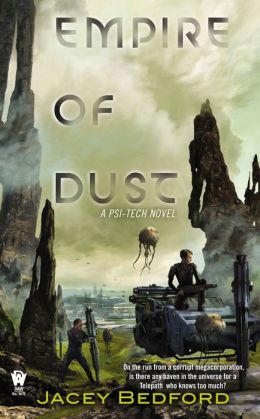Empire of Dust is Jacey Bedford’s debut novel. When I consider how to describe it, the first word that comes to mind is “old-fashioned”: there is little to say this space opera novel could not have been published two decades ago, or even three, and it suffers by comparison to the flourishing inventiveness of Ann Leckie and Elizabeth Bear, James S.A. Corey and Alastair Reynolds.
Though it may be unfair to judge it by those standards.
Carla Carlinni is a telepath. She used to work for Alphacorp, one of the two giant corporations whose actions and influence control most of human space. But after discovering massive corruption—and being betrayed by her lover, Alphacorp exec Ari van Bleiden—she’s on the run. With van Bleiden’s enforcers on the brink of catching up with her, she falls in with navigator Ben Benjamin, who works for the Trust, Alphacorp’s rival: a man who has his own experiences with being on the wrong end of corporate corruption. After an awkward beginning, Benjamin comes to like and, mostly, to trust Carla. In order to get her away from her pursuers, he arranges for her to join the support team he’s leading for a new colony: a support team composed entirely of psionically talented people, for a colony being founded by a group of religious separatists who believe that telepaths are abominations who come from the devil—and so is modern technology.
Add to this one more small problem: Benjamin rapidly discovers that the original surveys for the colony failed to uncover the fact that the planet is a goldmine for a natural resource on which space travel depends—a finite resource, one that people kill for.
What could possibly go wrong? Van Bleiden is still on Carla’s trail, and Benjamin will shortly discover that not only can he not trust the colonists, he can’t trust the people who sent him and his team out in the first place. Oh, and someone has messed up Carla’s brain bigtime via psychic brainwashing.
And he and Carla appear to be falling love.
Space opera comes in several varieties. David Drake and David Weber typify its military end; Sharon Lee and Steve Miller’s work is characteristic of some of its more pulpish tendencies. Lois McMaster Bujold and C.J. Cherryh represent other strands, Vernor Vinge one too, and Iain Banks yet another. It’s a broad church, and one that in the last five or six years seems to have attracted a fresh influx of energy and enthusiasm—and innovative repurposing of its old furniture.
Bedford is not writing innovative space opera, but rather the space opera of nostalgia. There is, here, something that reminds me vaguely of James H. Schmitz: not just the psionics but a certain briskness of writing style and the appeal of the protagonists, and the way in which Bedford’s vision of the societies of a human future feels at least two steps behind where we are today. This is a vision of a very Western future, and one where it’s unremarkable for a married woman to bear her husband’s name; where the ecological ethics of colonising “empty” planets don’t rate a paragraph, and religious separatists can set out to found a colony on the tools of 19th century settlers: oxen and wagons, historic crafts and manly men whose wives will follow them on the next boat.
Don’t mistake me: there’s nothing wrong with a certain pleasant nostalgia. One of the purposes of entertainment is to please, after all. But I confess myself uneasy with too much unexamined reproduction of old-fashioned genre furniture: nostalgia in entertainment falls easily into the trap of confirming our existing biases, or at least uncritically replicating them.
It’s easier to pass lightly over the tropishness of a setting if a novel has a straightforward, fast-paced narrative structure and compelling, intriguing characters. Empire of Dust’s protagonists are compelling; its antagonists, less so. And Bedford has fallen prey to the classic debut novel problem of having too much plot for her space. Several narrative threads feel underdeveloped as a result—threads that might, given more space and more willingness to interrogate the underlying tropes, have been much more powerfully affecting. Although there are moments when Bedford begins to interrogate a trope or two, only to shy off from looking at them too deeply.
This is not to say that Empire of Dust is unenjoyable: Bedford’s prose is brisk and carries the reader quite sufficiently along. This a debut that shows a writer with potential to do better work, and one whose next effort I will look forward to with interest.
Empire of Dust is available November 4th from DAW
Liz Bourke is a cranky person who reads books. Her blog. Her Twitter.










